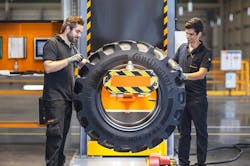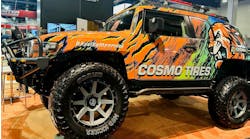Thirteen years after selling off its agricultural tire segment, Continental AG is getting back into the farm tire business with the launch of two tractor tires. The tires are expected to be available in the U.S. by the end of 2017. "Re-entering the agricultural tire business is an important step for us on the growth path of the tire division," says Nikolai Setzer, member of Continental's executive board and head of the tire division. "Over the past few years, we have been able to successfully expand the specialty tire business with the launch of port and earthmoving tires. The agricultural tire portfolio completes the product range for off-road use."
The tires: Tractor70 and Tractor85
Both the Tractor70 tire and Tractor85 tire are designed to be robust and durable, while also offering driving comfort, gentle ground handling and traction. Tractor70 is a wide tire for gentle ground impact and maximum traction. Tractor85 is an all-around farm tire for comfortable driving in the field and on the road.
The company says both tires feature a new bead technology and are made of a patent-pending nylon material, which will be known as "N.flex." The carcass of the new tractor tires is made of the specifically-designed nylon and its cords are twisted thousands of times, which Continental says makes the carcass tear-resistant, flexible and elastic. The rotation also ensures the material is able return to its original shape. The company says the tires are more robust and resistant than other radial farm tires. In the Tractor85, Continental says the N.flex technology prevents the "flat spot" farmers often experience in the morning — after tires have cooled down and the carcass material stretches and adapts to the ground. That flat spot gives farmers a bumpy ride and vibrations until the tires warm up again. The nylon instead shrinks less as the tires heat up, and stretches less as they cool down.
Continental's bead construction is also different. Here's how the company explains it:
"Conventional tractor tires use a bead with ten parallel wires, wrapped ten times around the core. This construction, however, makes assembly difficult as the overlapping cords make the bead very stiff and uneven and they end in a kind of step. Continental therefore only uses a single core wire for the Tractor70 and Tractor85 tires, which is wrapped around the bead core many times in a similar way to a garden hose. This single wire core makes the bead much more compact, thus more robust and durable, and facilitates mounting on the rim."
The bead technology in the Tractor70 allows a tractor to be driven with a heavy load and less tire pressure, which increases the contact surface. Along with the tire's rounded inter-lug design, the result is less soil compaction.
Tire production
The tires will be produced in Lousado, Portugal. The state-of-the-art production facility was set up in less than two years with an investment of 49.9 million euros. It is adjacent to Continental's passenger car tire production facility, which the company says "is one of the most efficient within the Continental Group." Continental has also set up a test and development center at the new agricultural tire production site, where the agricultural tires are tested for quality and developed further. The company invested an additional 2.5 million euros in the test center. The plant uses bead technology designed specifically for agricultural tires, which the company says ensures "robustness and optimize mounting and the rim fit of the tire. ASIC technology is used to ensure consistently low temperature distribution both inside and outside the tire during curing, which has a positive effect on both the efficiency of the plant and the rolling resistance of the tire."
The foundation for the new plant was laid in June 2016, and the first experimental tires were produced in November of that year. Test tire production began in April 2017, and regular "serial" tire production started in August. By the end of 2017 Continental says 5,000 tires will be produced in 13 sizes. (The passenger car tire plant next door has a capacity of about 18 million tires a year. Continental is investing 100 million euros to increase passenger tire production and expand its production of high-performance tires.)
'Engineered for efficiency'
Continental is marketing the tires as "engineered for efficiency," and says they're designed to increase the performance of agricultural machinery and the quality of their work, while reducing the resources deployed.
"All the tires in our new agricultural product range are designed to improve the efficiency of agricultural machinery — they are 'engineered for efficiency'," says Thorsten Bublitz, product line manager for agricultural tires. "To make a promise to our customers, we have also applied this quality seal to the side walls of all of our new agricultural tires."
Continental says by 2019 the tires will be offered in 100 sizes.
"The development of our new agricultural tires is based on years of experience in the specialty tire business as well as intensive market analysis," says Ralf Krieger, head of development and industrialization of agricultural tires at Continental Commercial Specialty Tires (CST). "As the first-borns in our premium radial tire range, Tractor70 and Tractor85 give an insight into our future portfolio which will comprise 100 sizes in many profile variations for different applications. At the same time, they provide solutions to the requirements of this particularly demanding application."
The communication campaign accompanying the market launch of the tires combines passion with technical expertise and innovation and reflects Continental's strong customer focus. It's called "With heart and soil," and emphasizes the devotion farmers have for their job and highlights the soil as the origin of the farmer’s harvest and yield and how it is optimally protected by Continental tires.
A history lesson
Continental produced its first pneumatic agricultural tire in 1928, and added sizes and applications throughout the 20th century. In 1990 the company expanded into international markets, including Europe and North America. In 2004 Continental tuned its focus on the automotive industry, and sold its farm tire segment to Mitas a.s.



